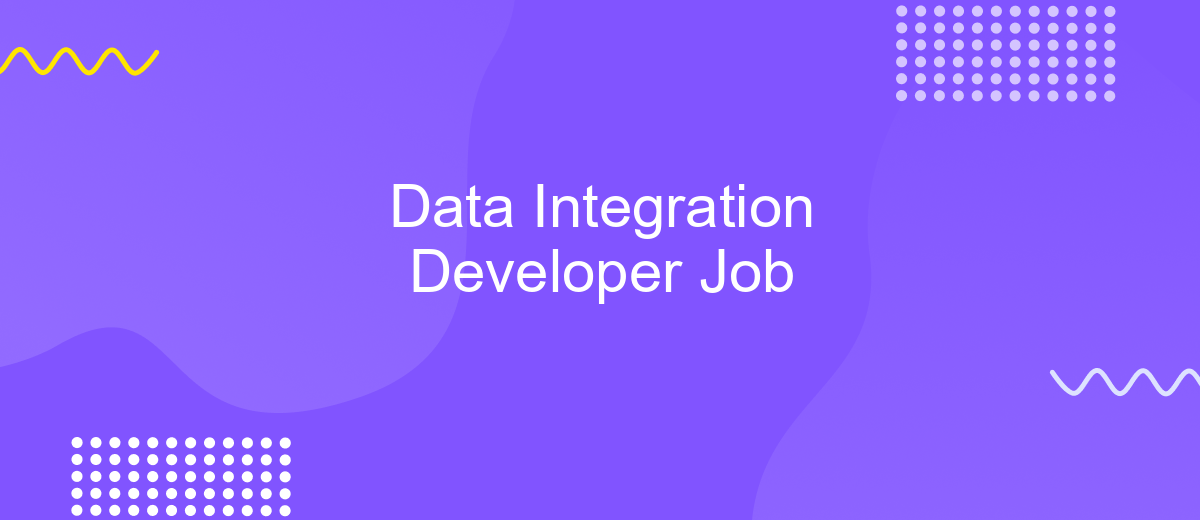Data Integration Developer Job
In today's data-driven world, the role of a Data Integration Developer is crucial for organizations seeking to harness the power of their data. These professionals specialize in combining data from various sources into a unified view, enabling businesses to make informed decisions. This article explores the key responsibilities, required skills, and career opportunities for aspiring Data Integration Developers.
Introduction
The role of a Data Integration Developer has become increasingly vital in today's data-driven world. As organizations collect vast amounts of data from various sources, the need to seamlessly integrate this information into a unified system is paramount. Data Integration Developers are responsible for designing, implementing, and managing the processes that ensure data from different systems can be combined and accessed in a coherent manner.
- Designing and developing data integration solutions
- Ensuring data quality and consistency across systems
- Collaborating with data scientists and analysts
- Maintaining and optimizing data workflows
- Implementing data security and compliance measures
These professionals must possess a deep understanding of various data integration tools and technologies, as well as strong problem-solving skills. Their work is crucial in enabling businesses to make informed decisions based on comprehensive and accurate data. As data continues to grow in volume and complexity, the expertise of Data Integration Developers will remain essential for any organization looking to harness the full potential of their data assets.
Responsibilities

As a Data Integration Developer, you will be responsible for designing, developing, and maintaining robust data integration solutions. You will work closely with various stakeholders to understand their data needs and ensure seamless integration across multiple systems. Your role will involve creating and managing ETL processes, developing data pipelines, and ensuring data quality and consistency throughout the integration lifecycle.
In addition, you will leverage tools like ApiX-Drive to streamline and automate data integration tasks. This includes setting up and configuring integrations, monitoring data flows, and troubleshooting any issues that arise. You will also collaborate with data analysts and engineers to optimize data workflows and provide support for data-driven decision-making. Your expertise will be crucial in ensuring that data is accurately and efficiently integrated, enabling the organization to achieve its business objectives.
Skills and Qualifications

To excel as a Data Integration Developer, one must possess a blend of technical expertise and soft skills. A comprehensive understanding of data integration tools, methodologies, and best practices is essential for ensuring seamless data flow across systems.
- Proficiency in ETL (Extract, Transform, Load) tools such as Informatica, Talend, or Apache Nifi.
- Strong knowledge of SQL and database management systems like Oracle, MySQL, or SQL Server.
- Experience with data warehousing concepts and technologies.
- Familiarity with cloud platforms like AWS, Azure, or Google Cloud.
- Excellent problem-solving and analytical skills.
- Ability to work collaboratively in a team environment.
- Effective communication skills to convey complex technical concepts.
In addition to these technical skills, a successful Data Integration Developer should be adaptable and eager to learn new technologies. They should also be detail-oriented, ensuring data accuracy and integrity in every project they undertake.
Education and Experience

To excel as a Data Integration Developer, a solid educational foundation and relevant experience are essential. A bachelor's degree in Computer Science, Information Technology, or a related field is typically required. Advanced degrees or certifications can further enhance your qualifications and open doors to more complex projects and leadership roles.
Experience in data integration is critical, as it involves understanding and managing diverse data sources, ensuring seamless data flow, and maintaining data integrity. Practical experience with data integration tools and platforms, such as Informatica, Talend, or Microsoft SSIS, is highly valued by employers.
- Bachelor's degree in Computer Science, Information Technology, or a related field
- Experience with data integration tools (e.g., Informatica, Talend, Microsoft SSIS)
- Strong understanding of database management and data warehousing concepts
- Proficiency in SQL and scripting languages
- Experience with cloud platforms and services (e.g., AWS, Azure, Google Cloud)
In addition to technical skills, effective communication and problem-solving abilities are crucial. Data Integration Developers often work closely with cross-functional teams, requiring them to translate complex technical concepts into actionable insights for stakeholders.
Career Path and Salary
The career path of a Data Integration Developer typically begins with foundational roles such as Junior Developer or Data Analyst. As professionals gain experience, they move into more specialized positions like Integration Specialist or Senior Data Integration Developer. Mastery of tools like ApiX-Drive, which facilitates seamless data integration across various platforms, can significantly enhance career prospects. Advanced roles may involve responsibilities such as designing and implementing complex integration solutions, optimizing data workflows, and managing large-scale integration projects.
In terms of salary, entry-level Data Integration Developers can expect to earn between ,000 and ,000 annually. With increased experience and specialized skills, particularly in using advanced integration tools like ApiX-Drive, salaries can rise to between ,000 and 0,000 per year. Senior professionals or those in managerial positions may command salaries upwards of 0,000. The demand for skilled Data Integration Developers continues to grow, making it a lucrative and stable career choice.
FAQ
What skills are required to become a Data Integration Developer?
What are the primary responsibilities of a Data Integration Developer?
How does ApiX-Drive assist in data integration?
What challenges might a Data Integration Developer face?
How important is data security in data integration?
Time is the most valuable resource in today's business realities. By eliminating the routine from work processes, you will get more opportunities to implement the most daring plans and ideas. Choose – you can continue to waste time, money and nerves on inefficient solutions, or you can use ApiX-Drive, automating work processes and achieving results with minimal investment of money, effort and human resources.

